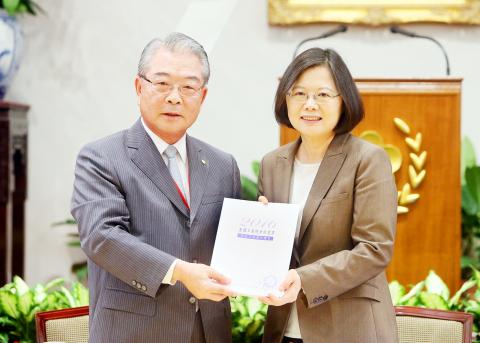President Tsai Ing-wen (蔡英文) yesterday said that the government would work to strike a balance between the interests of workers and industry, and find a win-win solution for both sides.
At a meeting with business leaders, Tsai said that while the administration would not leave enterprises to face the pressures of transformation alone, it would be certain to ensure workers’ rights.
She made the comment in response to the ongoing dispute concerning workers’ hours while meeting 55 of the Chinese National Federation of Industries board directors and supervisors, including chairman Hsu Sheng-hsiung (許勝雄) and vice chairman Leslie Koo (辜成允).

Photo: CNA
Tsai said that when she met representatives of small and medium-sized enterprises several weeks ago, she told them that industries in Taiwan have to speed up their transformation so that their profits can increase, more jobs can be created and salaries can be raised.
Tsai said that she understands that enterprises have to race against time to complete orders, while workers care more about salary levels and rest breaks.
“As the head of state, my job is not to curry favor with anybody. My responsibility is to decide on a direction of development for the nation and to ensure that everyone is on the development train,” Tsai said, adding that workers and businesses should move toward the goal together.
The nation’s most important goal is modification of the economic structure, she said, adding that the government would improve the investment environment and take measures to help companies, particularly small and medium-sized enterprises — which account for 98 percent of Taiwan’s total businesses — to transform themselves, while ensuring workers’ rights.
“The government has the responsibility to pull workers back from the brink of low pay and overwork,” she said, adding that the government would ensure all workers’ rights to receive paid holidays and overtime pay, and impose restrictions on work hours through robust enforcement of labor laws.
Tsai also said businesses should think about how to generate benefits and improve employees’ working conditions.
She also mentioned the dispute over a draft amendment to the Labor Standards Act (勞動基準法), saying that the proposal is aimed at ensuring workers’ right to a maximum of two paid days off per week, but has sparked heated debate among employees and employers.
The Executive Yuan and the Legislative Yuan should do their utmost to explain the issue to those concerned and allow them to express their views in order to reach a consensus on the matter, she said.
The government would also tackle a dispute regarding whether to cut the number of officially designated holidays per year from 19 to 12, as part of its plans to implement a two days off, 40-hour work week system, Tsai said.

Tropical Storm Gaemi strengthened into a typhoon at 2pm yesterday, and could make landfall in Yilan County tomorrow, the Central Weather Administration (CWA) said yesterday. The agency was scheduled to issue a sea warning at 11:30pm yesterday, and could issue a land warning later today. Gaemi was moving north-northwest at 4kph, carrying maximum sustained winds near its center of up to 118.8kph and gusts of 154.8kph. The circumference is forecast to reach eastern Taiwan tomorrow morning, with the center making landfall in Yilan County later that night before departing from the north coast, CWA weather forecaster Kuan Shin-ping (官欣平) said yesterday. Uncertainty remains and

SEA WARNING LIKELY: The storm, named Gaemi, could become a moderate typhoon on Wednesday or Thursday, with the Taipei City Government preparing for flooding A tropical depression east of the Philippines developed into a tropical storm named Gaemi at 2pm yesterday, and was moving toward eastern Taiwan, the Central Weather Administration (CWA) said. Gaemi could begin to affect Taiwan proper on Tuesday, lasting until Friday, and could develop into a moderate typhoon on Wednesday or Thursday, it said. A sea warning for Gaemi could be issued as early as Tuesday morning, it added. Gaemi, the third tropical storm in the Pacific Ocean this typhoon season, is projected to begin moving northwest today, and be closest to Taiwan on Wednesday or Thursday, the agency said. Today, there would likely

DISRUPTIONS: The high-speed rail is to operate as normal, while several airlines either canceled flights or announced early departures or late arrivals Schools and offices in 15 cities and counties are to be closed today due to Typhoon Gaemi, local governments announced last night. The 15 are: Taipei, New Taipei City, Taoyuan, Tainan, Keelung, Hsinchu and Kaohsiung, as well as Yilan, Hualien, Hsinchu, Miaoli, Chiayi, Pingtung, Penghu and Lienchiang counties. People should brace for torrential rainfall brought by the storm, with its center forecast to make landfall on the east coast between tonight and tomorrow morning, the Central Weather Administration (CWA) said. The agency issued a sea warning for the typhoon at 11:30pm on Monday, followed by a land warning at 11:30am yesterday. As of

CASUALTY: A 70-year-old woman was killed by a falling tree in Kaohsiung as the premier warned all government agencies to remain on high alert for the next 24 hours Schools and offices nationwide are to be closed for a second day today as Typhoon Gaemi crosses over the nation, bringing torrential rain and whipping winds. Gaemi was forecast to make landfall late last night. From Tuesday night, its outer band brought substantial rainfall and strong winds to the nation. As of 6:15pm last night, the typhoon’s center was 20km southeast of Hualien County, Central Weather Administration (CWA) data showed. It was moving at 19kph and had a radius of 250km. As of 3pm yesterday, one woman had died, while 58 people were injured, the Central Emergency Operation Center said. The 70-year-old